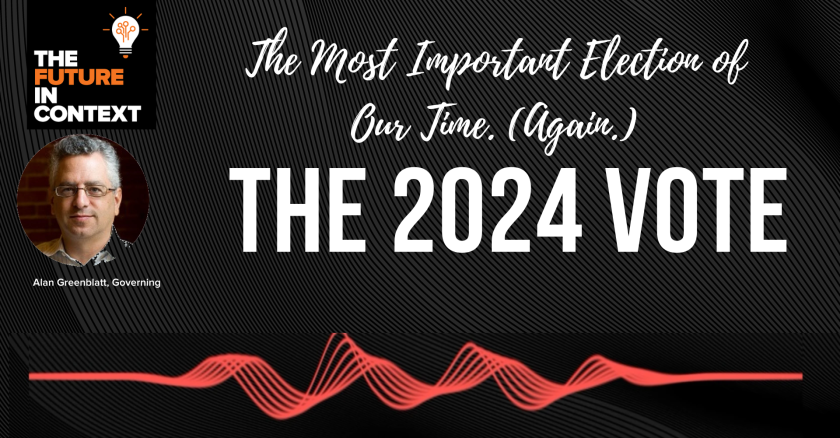The 2024 general election follows in a tradition of modern elections dating back to 1964 that are declared (or decried) as the most important of our time. In this episode that comes one year before ballots are counted, longtime political observer and Governing senior writer Alan Greenblatt joins TFIC for a wide-ranging discussion of what to expect, and who to watch, in the 365-day countdown.
SHOW NOTES
Here are the top 10 takeaways from this episode:
- “Most Important Election of Our Time”: Variations of the phrase have become common claims in recent presidential cycles. The 2024 election may well have a legitimate claim on the title. Its origins date back to the 1964 contest between Lyndon B. Johnson and Barry Goldwater, the first election in modern times to be called the most important of our time.
- Red, Blue and a Side of Purple: The Biden-Trump rematch at the top of the ticket in 2024 would emphasize the extreme polarization between Republicans and Democrats in a high-stakes election cycle. Abortion rights and crime remain strong rallying points for voters.
- Downstream Effects: The 2024 presidential election will influence state and local races, for good or for ill.
- Prospect of Violence: Having been denied a completely peaceful transfer of power in 2021, the Jan. 6 Capitol attack casts a long shadow over the 2024 cycle.
- Exodus of Election Officials and Polling Place Workers: In some states, up to a third of election workers have quit — some to retirement, others to avoid threats and harassment. Despite concerns of violence or intimidation at polling places, even recent history suggests a general resilience of the electoral system.
- Poll Watchers Increasingly Common: As the number of polling place workers decline, recent cycles have seen a rise in the number of third-party poll watchers.
- Vote-by-Mail or Vote-from-Home: Now a standard in a number of Democratic states, vote-by-mail overcame suspicion during the 2020 cycle, Republicans now show openness toward voting by mail as it caters to voters' preferences.
- State and Local Races: 2024 comes with pivotal governor races in North Carolina, New Hampshire, Vermont and Indiana. Legislative majorities are likely to remain stable, because of low competition levels, and the prediction that the year ending in four will be relatively stable due to effects of redistricting.
- The Rise of Uncontested Races: Approximating 40 percent of races are going uncontested in recent cycles, which can be read alternatively as a decline in voter choice (and, by extension, democracy) or the pragmatic matter strategic resource management by the parties.
- Third-Party Prospects: The existing political system favors the incumbent parties and resists third-party entrance, never mind success. Voters may not like the dominant parties but avoid third parties, mostly driven by fears of a spoiler effect, but that is unlikely to stop independent presidential bids (Robert F. Kennedy Jr. and Cornell West) and the No Labels Unity ticket in 2024.
Related Links to the stories referenced in the episode:
- Progressives Increasingly Challenged in Local Politics
- A Rare Successful Red State Democrat
- Is America Really Ready for a Third Party?
- Less Politics Is Local: States Get Increasingly Aggressive About Pre-Emption
- Taking the Temperature of American Democracy
Our editors used ChatGPT 4.0 to summarize the episode in bullet form to help create the show notes.













